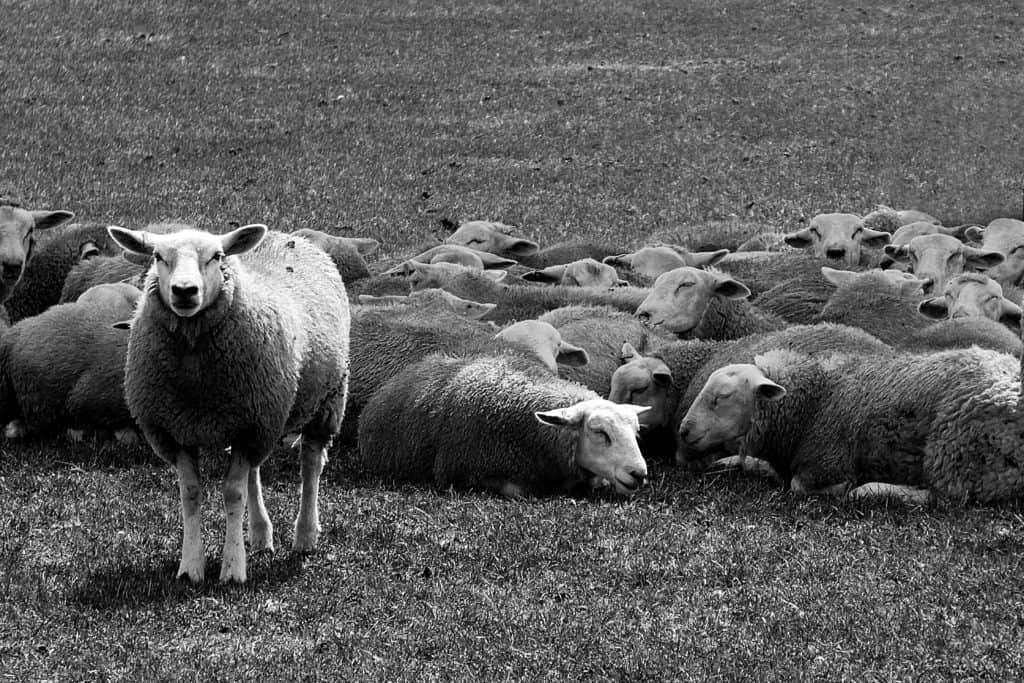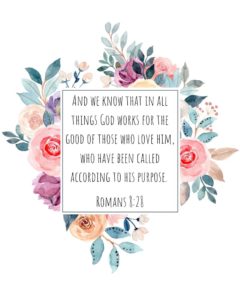Romans 8:28 is a funny little passage that promises that all things work together for our good. What the passages says exactly is this: “And we know that in all things God works for the good of those who love him, who have been called according to his purpose” (Romans 8:28; NIV).
At first, this seems a little bit counter-intuitive. How can things like death and disease work together for our good?
These questions might be front and center for us especially now: how can God take a global pandemic and work that for our good? We are perhaps familiar with some common platitudes that are meant to help explain this suffering and bring something good from it: We get more time with our families (those of us with kids, and kids still at home). We get to “slow down” our lives (though this doesn’t seem to apply to those of us with kids still at home). We appreciate what we have more. We realize that relationships are more important than things.
That is all true, but I do not think that it is the deepest truth about the reality of suffering and the promise that it will all be “worked for our good”. The fact remains that there are some really crummy things in the world and in our lives, and many of them can’t be explained away or given a silver lining.
How can God take chronic anxiety, or depression, and work that for our good? What about divorce, miscarriage, war, earthquakes, tsunamis…the list is seemingly endless.
Well, with a little bit of unpacking, I’d like to suggest that we can find some surprising things in Romans 8:28 (and the following verses) that perhaps help us to understand this passage better and might even shed some light on our understanding of the kingdom of heaven.

1. Romans 8:28 says that God uses all things for our good, not that all things are good.
No matter how optimistic you are, some things just suck. Things like war, death, human trafficking, and the like are awful.
But our God is more powerful than all the forces of evil and all the rotten things that happen in our lives. God took death itself and used it to redeem all of humanity. He reached down into the depths of our brokenness and began the restoration process.
And so, Romans 8:28 does not mean that all things are good, but rather that God is redeeming all things. He is “making all things new” (Isaiah 43:19; Revelation 21:5).
God is taking all of creation, even the broken stuff, and renewing and redeeming it.
And so, we should not take Romans 8:28 and use it to try to console ourselves, or others, that any trials or tragedies will ultimately result in success, that God will turn things around, or that even failures and losses are somehow “good.”
Rather, we should focus on the more important truth that God is bigger than all our tragedies, all our losses and our failures. Evil doesn’t win. In fact, in Christ’s death and resurrection, God enter into our brokenness and he redeemed the whole of it.
It is in this way that I think that Romans 8:28 reminds us that all things will be worked out for our good.

2. Romans 8:29 says that God wants us to be “conformed to the image of his Son.”
And Christ suffered. We have to remember that “for our good” does not necessarily mean “for our pleasure” or “for our comfort and security”.
God is transforming us into new creatures, into creatures who exist in harmony with him. And this involves suffering. It involves the death of our self-will, that little voice inside us that wants to remain in control and be comfortable and secure.
Can you imagine what the disciples thought on the day that Christ was crucified? They were not expecting a bodily resurrection. They thought that they were defeated. And yet God surprised them. He used torture and death to bring about new life. Jesus was raised from the grave in order to defeat death itself.
We might expect that God would have some similarly surprising things in store for us. If we cannot make sense of our suffering at the moment we go through it (or even for some time after), then we can at least rest assured that we are in good company in our confusion.
3. All things work together for the good of those who love God.
On the surface, this piece seems mightily unfair. All things work together only for believers? And unbelievers are shipwrecked on the shores of suffering and despair?
We’ve seen how this works out, for example, for Adam and Eve, for Israel during their period of exile: When we ignore God’s call, we run into rough patches.
Of course, if we call to God for help, he will come (Romans 10:13). He comes to help, he offers grace and mercy, again and again. But if we stubbornly refuse the help, then what more can be done?
This reminds me of a truth that I learned when I became a parent: when my kids call for help, I will come to help them. (Although sometimes that doesn’t look like what they think it should look like.)
But if they stubbornly insist on doing something their way, if they’re making poor choices and ignoring the advice of their parents, then they might fail spectacularly. They might get hurt. They might suffer.
How many times have I, as a parent, just said “Fine. Do it your way.” after a seemingly futile argument?
If my kids are absolutely insistent on doing something their way, despite wise counsel to the contrary, then what more can I do if I’ve already taught them and warned them and showed them the right way? Not much.
[This is the story of my children, and it is the story of Israel. It is the story of each one of us. We are called by God, we are given instruction, we are given grace and mercy, but we are also given the ability to refuse.]
If we are insistent on having our own way, God will let us have it. But it may not end well.
For we are given the choice to lay down our own wills, our own ideas about how life should be, our goals and ambitions, anything that we might hold up higher than God himself, and to follow Him, or to take up our arms and barricade ourselves against God’s kingdom. [This is the choice, I think, that was given to those fish in that fishing net from Matthew 13:47-52.]

4. God foreknew everything that would make you you.
Romans 8:29-30 says that “For those God foreknew he also predestined to be conformed to the image of his Son….And those he predestined, he also called; those he called, he also justified; those he justified, he also glorified.”
That includes all of your mistakes, all of your victories, all of your tragedies, all of the funny little things that make you you, and all of the ordinary stuff that goes into your story.
We can say this because God does not exist in time like we do. Although we have to live time out as though we are walking on a line, God sees the whole thing.
He sees your whole life.
This helped me to make sense of some things that happen that don’t seem to have a good purpose. They’re not especially bad, nor are they seemingly good.
Like a young friend of mine telling me that just the other day she smashed (accidentally) into a wall.
What she really said was this:
Her: “Can I give you a life tip?”
Me: “Sure.”
Her: “Don’t battering-ram your head into a metal wall.”
Me: “Umm….at least you don’t have a concussion?”
The discussion around this made it clear that saying that “God will bring some good out of this thing” is perhaps a stretch.
Similarly…about 20 years ago I fell from a big, wooden desk onto an elliptical machine on my back. At least I didn’t break it.
These things aren’t really things that yield some fruit later. They may just be near-misses that don’t really hurt you that much, but that don’t benefit you (or anyone else) either.
But they are all little parts of your story. And God takes up that WHOLE story, every little part of it, and redeems it. He transforms all of you into a heavenly creature.
Perhaps this is one meaning of the parable of the yeast and the bread from Matthew 13:33: When we have the little seed of God’s kingdom living inside of us, it will grow, it will rise, and it will transform the whole of our lives: the good, the bad, and the mundane. Every last bit of it.
5. It doesn’t say that you necessarily will see the good in this life.
We have to take the long view when it comes to all things working together for our good.
The fruit of “all things” may not be seen in this life. Because this life is not all that there is. We are promised bodily resurrection (1 Corinthians 15:42). We are promised more.
There is this touching episode in C.S. Lewis’ The Last Battle, where all of the characters in Narnia end up in Aslan’s country….essentially in heaven. And what we see in this story is that each character has shaped him or herself into a creature that is either at home in heaven or not.
The good that comes out of “all things” ultimately is the fruit that produces a heavenly creature, a creature who is in harmony with God and at home in heaven, who finds joy in following God’s lead and submitting their own wills to that of their Creator.
If we submit our wills to God, again and again, then he will take the entirety of our life, all the stuff that makes us us, and he will redeem it; he will transform us into heavenly creatures who are in harmony with him.
In fact, He is doing that right now. The kingdom of heaven, I think, is like a seed that is growing inside each one of us. If we nurture that seed, it will grow to incredible proportions. It will work its way through our entire lives and it will transform them. The transformation will not be complete this side of death, but we can rest assured of 2 things: evil does not win; and our world, and our very selves, are being transformed into something bigger, something greater, something of infinitely more value than any material things that we may store up here and now.
And so, what is the kingdom of heaven? (I know that Romans 8:28 isn’t explicitly about the kingdom of heaven, but really…it is about the kingdom of heaven.)
The kingdom of heaven is the restoration of all things. It is the redemption of every single part of your life that you lay at the feet of Christ. It is the victory of good over evil. It is the wiping away of all tears. It is the growth of faith, hope, and love. It is the transformation of ordinary selves into heavenly creatures who are in harmony with God, who submit their wills to that of the King of all kings. May we see that transformation in our lives and in our world today and all the days of our lives. 


